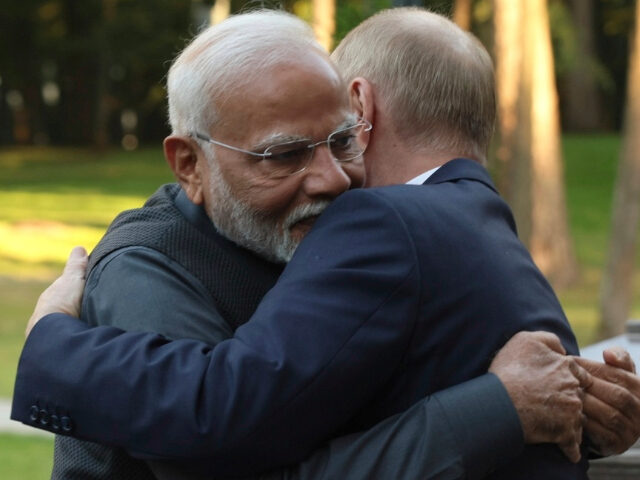Indian Prime Minister Narendra Modi arrived in Moscow on Monday for a two-day state visit that included a meeting with Russian President Vladimir Putin scheduled for Monday night.
Debate over the intended significance of Modi’s visit was rife in foreign policy circles on Monday. Officially, the Indian government said Modi was simply resuming a long-standing tradition of bilateral summits with Russia that was interrupted by first the Wuhan coronavirus pandemic and then Russia’s invasion of Ukraine. India has maintained cordial relations with Russia since the Cold War, upgrading to an official “strategic partnership” with an agreement signed in 2000.
The New York Times on Monday thought Modi wanted to signal his “determination to stick to his own diplomatic path” by hopping over to Moscow at a moment when the Western world is eager to isolate Putin and pressure him for peace.
For his part, Putin could use Modi’s visit to demonstrate that “the Kremlin continues to have a strong partnership with India, despite India’s deepening relationship with the United States.” India buys massive amounts of Russian oil at discount prices, an arrangement that has benefited both countries tremendously since the outbreak of the Ukraine war.
Bloomberg News speculated that Modi and Putin needed to clean up some thorny issues in their bilateral relationship. India is especially worried about Russia getting closer to regional arch-rival China, which has probably done more to help Russia get through sanctions than even India’s gigantic oil purchases. India’s massive trade imbalance with Russia is also causing Modi some political trouble at home.
Petr Topychkanov of the Stockholm International Peace Research Institute said that while Modi and Putin tout their close friendship in public, Putin might “face questions from Modi about the increasingly close ties between Russia and China” while the two leaders are “behind closed doors.”
Business Insider wondered if Modi was actively trying to irritate the United States and Europe by meeting with Putin at roughly the same time NATO is meeting in Washington to discuss the Ukraine crisis.
“India’s engagement with Russia isn’t a good look for the U.S., as it comes while Washington is trying to isolate Putin,” Business Insider pointed out, quoting U.S. officials who said that point has been very delicately raised with the Indian government.
Modi just came through a bruising election that saw him win a historic third term but with greatly reduced parliamentary power for his Bharatiya Janata Party. He has solid domestic political reasons for asserting his independence, and he might hope to use India’s relationship with Russia as leverage to get a better deal from the U.S. as it seeks to woo India more firmly into its orbit and tries to displace Russia as India’s top military supplier.
A chummy visit with Putin could also be a way for Modi to let the Western world know that he will only accept so much criticism of India’s internal affairs, including its human rights record.
Human Rights Watch (HRW) on Monday said it was unseemly for Modi, as the head of a massive democracy, to grant the authoritarian war criminal Putin a much-needed shot of diplomatic legitimacy:
Russia’s toxic global standing has made it rare, these days, for leaders of major democratic powers like India to visit. So, when Modi visits Moscow, many Ukrainians may feel aggrieved if he fails to publicly acknowledge the atrocities and their suffering. The many Russians horrified by the Kremlin’s abusive war may also feel betrayed.
HRW chastised Modi by telling him to reflect on how Russia’s attempt to conquer Ukraine resembles the colonial abuses perpetrated against India before it won independence from the United Kingdom in 1947, including Russia’s plans to erase Ukraine’s history and culture.
On the other hand, HRW noted that Modi’s administration has “long discriminated against religious minorities, cracked down on civil society, and failed to uphold economic and social rights.”
Modi is well aware of these criticisms, and he has presided over major diplomatic rows with the United States and Canada over persecuting and, in some cases, allegedly assassinating Sikh separatists on foreign soil. Modi may find it useful to remind the Western world that he has at least one friend who will never lecture him about human rights.
The Washington Post took the most pessimistic view of all on Monday, combining Modi’s visit to Moscow with Hungarian Prime Minister Viktor Orbán’s surprise visit to Beijing on the same day as signs of a “multipolar, non-Western world order” emerging.
Although Modi could not have planned it that way, the symbolism of his arrival in Moscow just hours after a vicious Russian missile attack on Kyiv and other major Ukrainian cities was potent.
Orbán himself paid a visit to Moscow last week, enraging European leaders who said he was sending “the wrong signal to the outside world,” as Swedish Prime Minister Ulf Kristersson put it. Modi is sending much the same message, and both of them are playing into China and Russia’s argument that Western powers cannot negotiate peace in Ukraine.

COMMENTS
Please let us know if you're having issues with commenting.